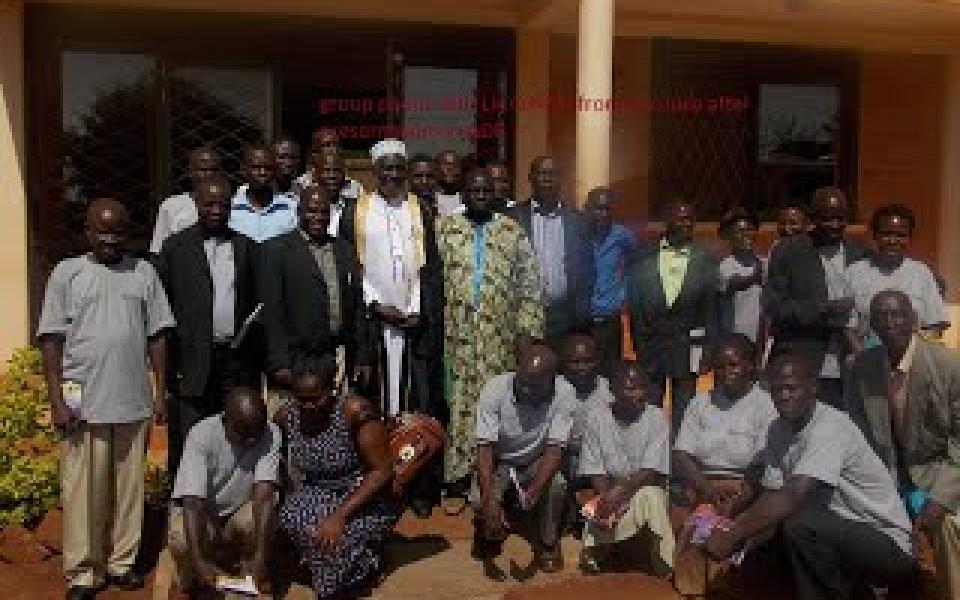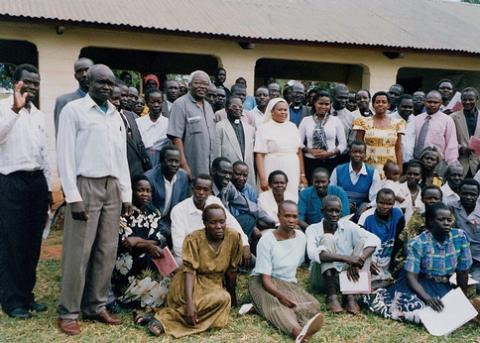
Read a keynote address given by Bishop Ocholla, a URI Global Council member, to the International Criminal Court. Bishop Ocholla recommends a justice reconciliation process called Mato Oput for perpetrators of horrific violence that happened during the war years with the Lord's Resistance Army in Northern Uganda. Mato Oput can enrich the URI community’s understanding of the concepts of justice, forgiveness, community, and reconciliation.
Bishop Ocholla is a member of Acholi Religious Leaders Peace Initiative, a URI member group in Gulu, Uganda. This group is made up of religious leaders from different faith traditions living on Acholi Land in Northern Uganda. Members of this group were influential in negotiating an end to the 20-year war between the Ugandan military and The Lord's Resistance Army, and the members, including Bishop Ocholla, were instrumental in helping to mitigate land disputes following the war.
Keynote Address:
The Cultural Justice System of Mato Oput (Reconciliation)
The Cultural Justice System of Mato Oput is pro-life and holistic as compared to the Western Court Justice System. The Western Court Justice System is punitive or retributive in nature. It promotes hatred, enmity, division, disunity, bitterness, polarization, but above all, it brings an alienation on both sides! Punishment or capital punishment is seen as justice done to the victims and survivors of violent conflicts.
On the other hand, the cultural justice system brings restoration of the broken human relationships, a complete transformation into the lives of the two communities involved in violent conflict.
It creates a healing process in the hearts of all those who have been wounded, but above all, it brings new life or salvation to all. It allows the offender to go through the process of truth-telling where there are no denials, no lies, and no deceptions. It helps the whole truth to be revealed by the offender himself or herself through a personal testimony at the gate of the village.
The revealed whole truth usually leads to genuine accountability and genuine accountability ultimately leads to genuine reconciliation processes.
The offender reveals his or her own identity and the motives for killing a human being. Once his or her identity and motives are made known, the community then takes community-based collective responsibility, on behalf of the offender and of his or her immediate family, by performing the ritual of Nyono-tonggweno (stepping on an egg). The ritual of Nyono-tonggweno symbolizes three things;
- Acceptance of the offender as still a member of the community, a child of God created in the image of God, despite the great shame and disgrace he or she has brought upon the community at large.
- The purity and sanctity of human life which must not be violated or desecrated by anybody in the world.
- Self-destruction, for whoever kills a human being, he or she destroys his or her own humanity!
In other words, he or she is no longer regarded as a human being in the truest sense of the word!
The Cultural Justice System of Mato Oput brings restoration of the broken human relationships, a complete transformation into the lives of the two communities involved in violent conflict, it creates a healing process in the hearts of all those who have been wounded, but above all, it brings new life or salvation to all.
The ICC must, therefore, consider very seriously the situations and the circumstances of the formerly abducted children whose human rights and human dignity have been grossly violated and desecrated by the LRA over the years. The focus here is to restore their human broken relationships. To recognize the magnitude of the problems they had gone through during the LRA captivity over the years! But above all, to allow all the formerly abducted children to go through the healing process as a mechanism that will ultimately lead to the National Reconciliation Processes!
Forgiveness is a special gift from God to humanity. It must be received and accepted and lived in total obedience to God. The Cultural Justice System of Mato Oput is, indeed, the best mechanism for conflict resolution in the world! I, therefore, wish to appeal to the International Community to embrace this Cultural Justice System of Mato Oput as the best mechanism for conflict resolution in the world!
I say this for God and for our beloved Country, Uganda.
Bishop Ochola II. Ameda Mollo Macleord Baker
Retired Anglican Bishop of the Diocese of Kitgum
The Province of the Church of Uganda,
The Chairperson, URI, Great Lakes Region,
URI Global Council Trustee.

